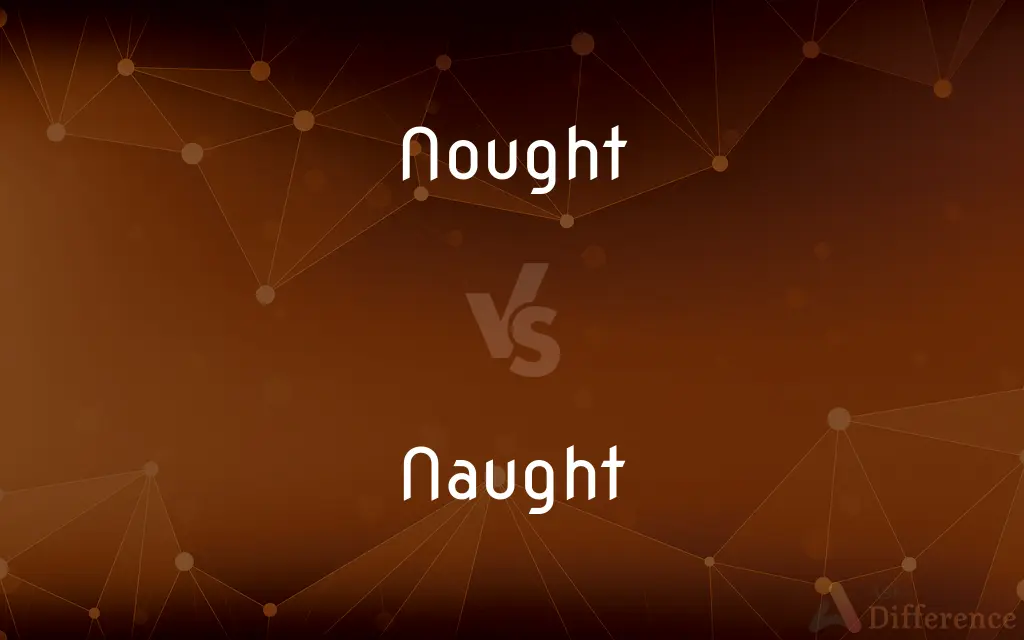Nought vs. Naught — What's the Difference?
By Urooj Arif & Fiza Rafique — Updated on April 7, 2024
Nought and naught both refer to the absence of quantity or nothing, but "nought" is primarily used to denote zero (0), while "naught" often implies worthlessness or nothingness.

Difference Between Nought and Naught
Table of Contents
ADVERTISEMENT
Key Differences
Nought is commonly used in British English to represent the numeral 0, especially in mathematical or numerical contexts. Whereas, naught is used more broadly to signify the concept of nothing or the absence of anything, often carrying connotations of nullity or worthlessness in both British and American English.
While nought is primarily mathematical, appearing in discussions of figures, scores, or measurements, naught is poetic and philosophical, used in literature and everyday speech to convey notions of emptiness or the lack of value. This difference highlights how context influences the choice between these two terms.
The use of nought in a sentence usually refers to quantity or position, such as in scores or sequences. On the other hand, naught is often employed to express failure, insignificance, or the void, enriching its usage with a more nuanced or figurative tone.
In scientific and technical writing, nought is preferred for its precision as a numerical symbol, underscoring its specificity. Conversely, naught is favored in contexts requiring a more expressive or dramatic tone, underscoring the flexibility of language to convey subtle distinctions in meaning.
Despite these differences, nought and naught can sometimes be used interchangeably in casual or less formal contexts, particularly when the intended meaning is clear from the surrounding text. This interchangeability showcases the fluid nature of language and its adaptation to the preferences of its users.
ADVERTISEMENT
Comparison Chart
Definition
Represents the numeral 0
Signifies nothingness or absence
Usage Context
Mathematical, numerical
Literary, philosophical
Connotations
Neutral, related to quantity
Often implies worthlessness or nullity
Example Contexts
Scores, measurements, sequences
Expressions of failure, insignificance
Interchangeability
Less common, mainly in informal contexts
More common, especially in poetic usage
Compare with Definitions
Nought
Indicating a null result.
All our efforts came to nought.
Naught
Illustrating emptiness.
In the end, all was naught but ashes.
Nought
The numeral zero.
The team scored nought in the final match.
Naught
Conveying worthlessness.
Wealth is naught if happiness is absent.
Nought
Symbolizing absence in sequences.
The code begins with two noughts.
Naught
Emphasizing total failure.
His attempts amounted to naught.
Nought
Used in mathematical expressions.
Two noughts make the number one hundred.
Naught
Used in expressions of negation.
Let not your efforts come to naught.
Nought
Referring to zero in historical contexts.
In ancient times, the concept of nought was revolutionary.
Naught
Signifying nothingness.
Dreams turn to naught without action.
Nought
Variant of naught.
Naught
Nonexistence; nothingness.
Nought
Nothing; something which does not exist.
Naught
The figure 0; a cipher; a zero.
Nought
A thing or person of no worth or value; nil.
Naught
Nonexistent.
Nought
(UK) Not any quantity of number; zero; the score of no points in a game.
0.4 — nought point four / zero point four
Naught
Insignificant.
Nought
(UK) The figure or character representing, or having the shape of, zero.
Naught
Nothing.
Naught can come of this, you mark my words.
Nought
(obsolete) Good for nothing; worthless.
Naught
(archaic) Nothingness.
Nought
Wicked, immoral.
Naught
Alternative spelling of nought
Nought
To abase, to set at nought.
Naught
Alternative spelling of nought
Nought
To no extent; in no way; not at all.
Naught
Nothing.
Doth Job fear God for naught?
Nought
Not.
Naught
The arithmetical character 0; a cipher. See Cipher.
Nought
Nothing; zero.
Naught
In no degree; not at all.
To wealth or sovereign power he naught applied.
Nought
See Naught.
Naught
Of no value or account; worthless; bad; useless.
It is naught, it is naught, saith the buyer.
Go, get you to your house; begone, away!All will be naught else.
Things naught and things indifferent.
Nought
A mathematical element that when added to another number yields the same number
Naught
Hence, vile; base; naughty.
No man can be stark naught at once.
Naught
A quantity of no importance;
It looked like nothing I had ever seen before
Reduced to nil all the work we had done
We racked up a pathetic goose egg
It was all for naught
I didn't hear zilch about it
Naught
Complete failure;
All my efforts led to naught
Common Curiosities
Can nought and naught be used interchangeably?
They can sometimes be used interchangeably, especially in informal contexts, but their meanings differ in specific or formal usage.
Is nought or naught more common in American English?
In American English, "naught" is more commonly used to signify nothingness, whereas "nought" is less common and more specific to numerical contexts.
Why might someone choose naught over nought in writing?
Someone might choose naught over nought to convey a tone of nullity, insignificance, or philosophical depth.
What is the difference between nought and naught?
Nought primarily denotes the number zero, while naught refers to nothingness or the absence of anything.
What is an example of nought in technology?
In binary code, nought represents one of the two fundamental states, often symbolized as 0.
Can the use of nought or naught affect the tone of a sentence?
Yes, nought tends to be neutral or technical, while naught can introduce a more philosophical or somber tone.
What contexts are appropriate for using nought?
Nought is appropriate in mathematical, scientific, and any context where precise numerical representation is needed.
How is naught used in literature?
In literature, naught is used to convey notions of emptiness, worthlessness, or the existential concept of nothing.
Can nought have philosophical implications?
While primarily numerical, nought can carry philosophical implications when discussing concepts of zero or void in certain contexts.
Is naught considered outdated?
While its use has declined, naught is not considered outdated and appears in various forms of contemporary speech and writing.
How does naught contribute to poetic language?
Naught adds a layer of emotional or existential depth, enriching poetic language with themes of absence, void, or negation.
What role does context play in choosing between nought and naught?
Context, such as the need for precision or expressive depth, guides the choice between nought and naught.
Are there synonyms for nought and naught?
Synonyms include zero for nought and nothing for naught, though nuances in meaning and use may vary.
How do historical uses of nought and naught differ?
Historically, nought was used in the development of numerical systems, while naught has been used more broadly to discuss concepts of nothingness or void.
Is the distinction between nought and naught important in everyday language?
While the distinction may not always be crucial in casual conversation, it becomes important in formal, literary, or technical contexts for clarity and nuance.
Share Your Discovery

Previous Comparison
Wordplay vs. Pun
Next Comparison
Vlog vs. BlogAuthor Spotlight
Written by
Urooj ArifUrooj is a skilled content writer at Ask Difference, known for her exceptional ability to simplify complex topics into engaging and informative content. With a passion for research and a flair for clear, concise writing, she consistently delivers articles that resonate with our diverse audience.
Co-written by
Fiza RafiqueFiza Rafique is a skilled content writer at AskDifference.com, where she meticulously refines and enhances written pieces. Drawing from her vast editorial expertise, Fiza ensures clarity, accuracy, and precision in every article. Passionate about language, she continually seeks to elevate the quality of content for readers worldwide.
















































